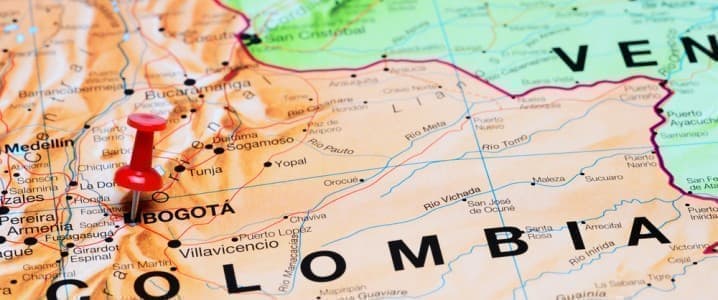Business
Big Oil Exits Colombia as Violence and Tax Hikes Escalate

Colombia’s oil industry faces a significant crisis as major energy companies abandon the country due to escalating violence, high taxes, and regulatory uncertainty. The departure of these companies, including ExxonMobil, highlights the growing challenges within Colombia’s energy sector since the arrival of President Gustavo Petro, the nation’s first leftist leader, in August 2022.
Under President Petro, policies have created a tumultuous environment for the hydrocarbon industry. The introduction of a hydraulic fracturing ban and increased taxes on oil sales have alarmed investors. By mid-2023, these measures prompted a wave of exits from multinational energy firms, which have opted to withdraw rather than risk further fiscal and operational instability.
ExxonMobil’s Withdrawal
ExxonMobil’s exit from Colombia was largely influenced by the ban on hydraulic fracturing, a contentious extraction method that had been under review since 2022. The company’s decision to suspend or liquidate its eight exploration and production contracts by April 2023 marked a significant blow to the industry. Alongside the fracking ban, rising taxes and increasing insecurity compounded the difficulties for operators in the region.
In November 2022, the Colombian government introduced a sliding tax on oil revenues, starting at 5% when Brent crude prices hit $67.30 per barrel and escalating to 15% for prices exceeding $82.20 per barrel. Although an attempt to eliminate the tax deductibility of royalty payments was overturned by Colombia’s Constitutional Court, the burden on oil companies remains high. Following these developments, Colombia’s credit ratings were downgraded by agencies such as S&P and Moody’s, further highlighting the fiscal pressures facing the government.
Security Concerns and Economic Implications
The situation has been worsened by a surge in violence and lawlessness, particularly in rural areas where oil operations are concentrated. The collapse of Petro’s policy of “total peace” has led to intensified conflicts between state forces and illegal armed groups, including the FARC-EMC and the National Liberation Army (ELN). As these groups vie for control over lucrative drug trafficking routes, the safety of oil infrastructure has been compromised, resulting in production disruptions and increased operational costs.
In 2023, Colombia recorded a staggering 2,664 metric tons of cocaine production, with significant coca cultivation impacting oil-rich regions. The combination of rising conflict and the illicit drug trade has fueled violence in key areas such as Putumayo, Caquetá, and Nariño. These developments create a precarious environment for energy companies, making it increasingly difficult to maintain production levels.
As economic conditions deteriorate, the Colombian government is grappling with a widening budget deficit, projected to reach 7.1% of gross domestic product (GDP) in 2024, up from an earlier target of 5.1%. In response, Bogota has imposed a temporary 1% levy on crude oil sales, which has raised concerns among oil companies that it may not be lifted as promised.
The cumulative effects of regulatory changes, security risks, and economic instability are placing immense strain on Colombia’s oil sector, which is struggling to recover from the impacts of the COVID-19 pandemic. The exit of major players such as ExxonMobil, alongside the withdrawal of other firms like Shell and Repsol, poses serious challenges for the future of Colombia’s energy industry.
As the country navigates these turbulent waters, the potential for an energy crisis looms large, exacerbating poverty and further destabilizing an already fragile economy. The ongoing decline in hydrocarbon production and investment inflows, coupled with rising energy imports, may lead to dire consequences for Colombian households and businesses reliant on fossil fuels. The future of Colombia’s oil industry remains uncertain as it grapples with these multifaceted issues.
-

 World2 days ago
World2 days agoCoronation Street’s Shocking Murder Twist Reveals Family Secrets
-

 Entertainment4 months ago
Entertainment4 months agoKate Garraway Sells £2 Million Home Amid Financial Struggles
-

 Entertainment3 months ago
Entertainment3 months agoAnn Ming Reflects on ITV’s ‘I Fought the Law’ Drama
-

 Health3 months ago
Health3 months agoKatie Price Faces New Health Concerns After Cancer Symptoms Resurface
-

 Entertainment3 weeks ago
Entertainment3 weeks agoCoronation Street Fans React as Todd Faces Heartbreaking Choice
-

 World3 weeks ago
World3 weeks agoBailey Announces Heartbreaking Split from Rebecca After Reunion
-

 World5 days ago
World5 days agoKevin Sinfield Exceeds Fundraising Goal Ahead of Final Marathons
-

 Entertainment3 months ago
Entertainment3 months agoCoronation Street’s Carl Webster Faces Trouble with New Affairs
-

 Entertainment5 days ago
Entertainment5 days agoTwo Stars Evicted from I’m A Celebrity Just Days Before Finale
-

 Entertainment3 months ago
Entertainment3 months agoWhere is Tinder Swindler Simon Leviev? Latest Updates Revealed
-

 Entertainment4 months ago
Entertainment4 months agoMarkiplier Addresses AI Controversy During Livestream Response
-

 Science2 months ago
Science2 months agoBrian Cox Addresses Claims of Alien Probe in 3I/ATLAS Discovery





















